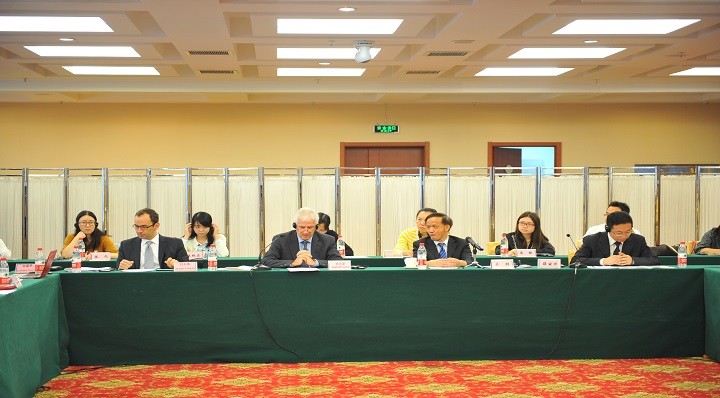
EU-China Workshop on Trademark Best Practice
IP Key recently organized a “Trademark Best Practice Seminar” in cooperation with SAIC. The meeting took place at SAIC’s Guesthouse facilities in Beijing.
About 30, Chinese official and examiners from several different departments of SAIC/CTMO (International Registrations, GI, Application, Legal and International Affairs, IT, TRAB), succesfully engaged their EU peers in in-depth discussions covering a set of trademark related topics jointly identified by IP Key and SAIC over the course of 2 months.
Several EU IP experts from government, academia and industry also joined the event.
During the morning session, EU speakers (OHIM senior legal experts), extensively presented the CTM practices on, among other matters:
- Criteria for assessment of likelihood of confusion;
- Quality of decision making processes;
- Examination of trademarks comprising geographical names;
- Assessment of distintive character, acquired secondary meaning;
- Formalities for accepting evidence originating from abroad;
- Multi-class applications and classification issues;
- Examination of non-conventional marks;
- Proof of bad faith.
The afternoon session was almost entirely dedicated to presentations by Chinese experts and followed by a lively EU-China panel discussion involving all participants.
SAIC’s speakers presented the new practice of CTMO on multi-class applications (newly introduced by the revision of the Chinese Trademark Law in May early this year), examination of sound marks and the recently renovated TRAB procedure’s timeline.
The exerience of CTMO and TRAB under newly adopted Trademark Law is still limited in time, though the exchanges of September 22 in Beijing outlined how the reform could bring important changes for trademark owners in the future.
CTMO and TRAB strive to the improve the overall quality and efficiency of the trademark examination and review system but still have to cope with extremely high volumes of trademark applications and review adjudication cases. This partly explains, for example, the current practice of shortly motivated decisions in trademark refusals or oppositions.
On such respect, OHIM’s experts had the chance to introduce the IT tools currently adopted by OHIM examiners and explain how the decision making process work in the practice. Further exchanges on this and other topics would therefore be welcome in the future.
CTMO senior officials pay much attention to the overseas practice, while trusting the choices made by Chinese legislator in terms of reform policy: interesting and constructive debates took place (again) on the consequences entailed in some of the reform’s most discussed changes, such as the impossibility for opponents to appeal unfavourable decisions in opposition procedures or the tight timeline in the examination stage.
As regard the latter, it is still not clear what would be the concrete consequences in the practice if the Office does not meet the deadlines.
The meeting once again confirmed that the formula of “peer-to-peer exchanges” between Chinese and European trademark experts on practical issues of everyday trademark practice, is a particularly effective way for reaching a common understanding on methods for problem-solving to be applied in similar situations by examiners in China and in the EU.
Thanks to the presence at the meeting of several Chinese and EU trademark practitioners who are familiar with main challenges faced by applicants in China, it was possible to also enter into the details of those CTMO’s practices that still raise concerns. It was quite important, for example, to understand how the reputation of a mark on the market could be assessed on the basis of evidence of use that not necessarily (or not entirely) should originate from the domestic market of reference, i.e. China and the EU respectively.
Participants were invited to submit comments and questions to IP Key for follow up with SAIC.
After the meeting, a delegation of SAIC’s officials proceeded with IP Key on a roving seminars program organized by IP Key to introduce the recent innovations of the Community Trademark, respectively in Shenyang and Harbin, with the support of local AIC.
Finally, bilingual English-Chinese presentations and meeting materials are available here for download.
